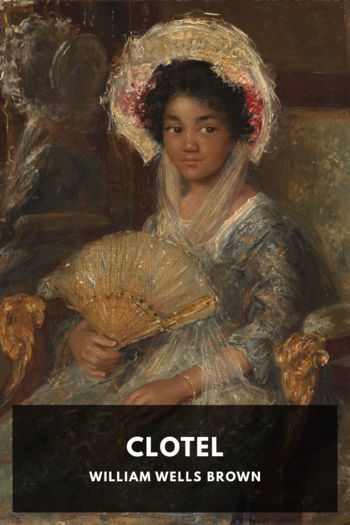Clotel, William Wells Brown [i like reading books .txt] 📗

- Author: William Wells Brown
Book online «Clotel, William Wells Brown [i like reading books .txt] 📗». Author William Wells Brown
“I wonder the negroes don’t attempt to get their freedom by physical force.”
“It ain’t no use for ’em to try that, for if they do, we puts ’em through by daylight,” replied Huckelby.
“There are some desperate fellows among the slaves,” said Snyder.
“Indeed,” remarked Carlton.
“Oh, yes,” replied the preacher. “A case has just taken place near here, where a neighbour of ours, Mr. J. Higgerson, attempted to correct a negro man in his employ, who resisted, drew a knife, and stabbed him (Mr. H.) in several places. Mr. J. C. Hobbs (a Tennessean) ran to his assistance. Mr. Hobbs stooped to pick up a stick to strike the negro, and, while in that position, the negro rushed upon him, and caused his immediate death. The negro then fled to the woods, but was pursued with dogs, and soon overtaken. He had stopped in a swamp to fight the dogs when the party who were pursuing him came upon him, and commanded him to give up, which he refused to do. He then made several efforts to stab them. Mr. Roberson, one of the party, gave him several blows on the head with a rifle gun; but this, instead of subduing, only increased his desperate revenge. Mr. R. then discharged his gun at the negro, and missing him, the ball struck Mr. Boon in the face, and felled him to the ground. The negro, seeing Mr. Boon prostrated, attempted to rush up and stab him, but was prevented by the timely interference of someone of the party. He was then shot three times with a revolving pistol, and once with a rifle, and after having his throat cut, he still kept the knife firmly grasped in his hand, and tried to cut their legs when they approached to put an end to his life. This chastisement was given because the negro grumbled, and found fault with his master for flogging his wife.”
“Well, this is a bad state of affairs indeed, and especially the condition of the poor whites,” said Carlton.
“You see,” replied Snyder, “no white man is respectable in these slave states who works for a living. No community can be prosperous, where honest labour is not honoured. No society can be rightly constituted, where the intellect is not fed. Whatever institution reflects discredit on industry, whatever institution forbids the general culture of the understanding, is palpably hostile to individual rights, and to social well-being. Slavery is the incubus that hangs over the Southern States.”
“Yes,” interrupted Huckelby; “them’s just my sentiments now, and no mistake. I think that, for the honour of our country, this slavery business should stop. I don’t own any, no how, and I would not be an overseer if I wern’t paid for it.”
VIII The SeparationIn many ways does the full heart reveal
The presence of the love it would conceal;
But in far more the estranged heart lets know
The absence of the love, which yet it fain would show.
At length the news of the approaching marriage of Horatio met the ear of Clotel. Her head grew dizzy, and her heart fainted within her; but, with a strong effort at composure, she inquired all the particulars, and her pure mind at once took its resolution. Horatio came that evening, and though she would fain have met him as usual, her heart was too full not to throw a deep sadness over her looks and tones. She had never complained of his decreasing tenderness, or of her own lonely hours; but he felt that the mute appeal of her heartbroken looks was more terrible than words. He kissed the hand she offered, and with a countenance almost as sad as her own, led her to a window in the recess shadowed by a luxuriant passionflower. It was the same seat where they had spent the first evening in this beautiful cottage, consecrated to their first loves. The same calm, clear moonlight looked in through the trellis. The vine then planted had now a luxuriant growth; and many a time had Horatio fondly twined its sacred blossoms with the glossy ringlets of her raven hair. The rush of memory almost overpowered poor Clotel; and Horatio felt too much oppressed and ashamed to break the long deep silence. At length, in words scarcely audible, Clotel said: “Tell me, dear Horatio, are you to be married next week?” He dropped her hand as if a rifle ball had struck him; and it was not until after long hesitation, that he began to make some reply about the necessity of circumstances. Mildly but earnestly the poor girl begged him to spare apologies. It was enough that he no longer loved her, and





Comments (0)